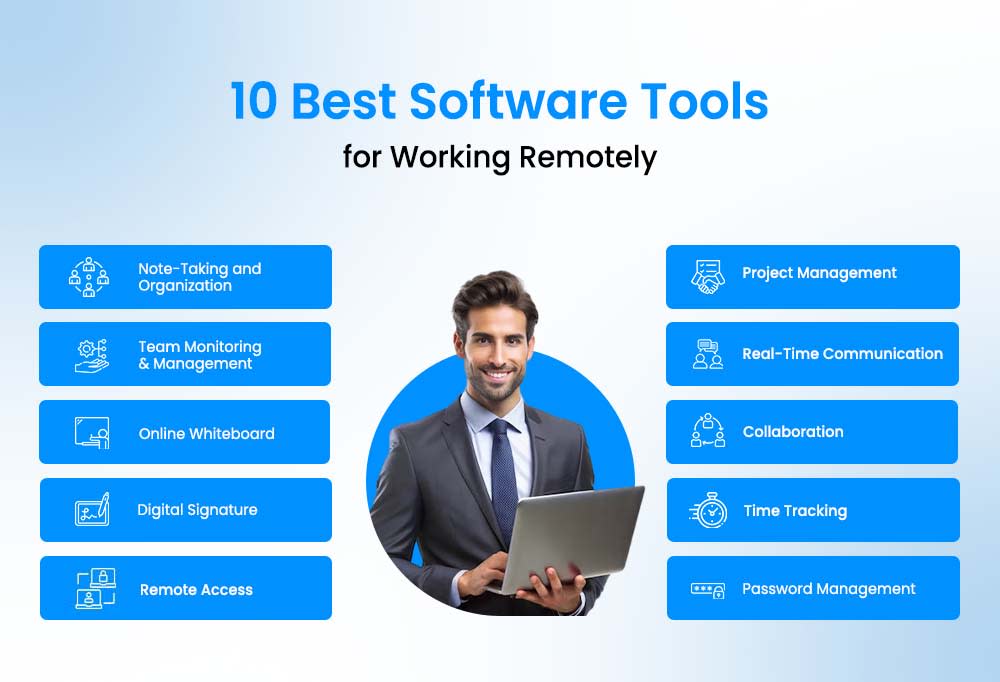In today's remote-first world, having the right tools is essential for maintaining productivity and collaboration while working from home. With the increasing need for seamless communication, secure file sharing, and effective project management, selecting the best software can make all the difference.
This blog highlights the top ten software tools that can enhance your remote work experience, providing you with the necessary resources to stay connected, organized, and efficient, no matter where you're working from. Whether you're an individual contributor or part of a team, these tools are designed to help you thrive in a home-based work environment.
With that said, here are the 10 types of software tools you and your team need so you can be productive while enjoying the benefits of working from home:
Project Management
Real-Time Communication
Collaboration
Team Monitoring & Management
Time-Tracking Software
Password Management Tools
Note-Taking and Organization Apps
Online Whiteboard Tools
Digital Signature Software
Remote Access
Must-Have Features for Remote Work Software
Selecting the right software for remote work goes beyond choosing popular tools; it's about ensuring those tools meet the specific demands of a remote environment. Here are the key features to look for:
Cross-Platform Compatibility: The software must work seamlessly across different operating systems and devices, including desktops, laptops, tablets, and smartphones. This ensures that team members can stay productive regardless of their device or location.
User-Friendly Interface: A straightforward, intuitive interface is crucial for minimizing the learning curve and ensuring that all team members, regardless of their technical expertise, can use the software effectively. This leads to higher adoption rates and less time spent on training.
Robust Security Measures: With remote work, data security is paramount. Look for software that includes end-to-end encryption, multi-factor authentication, and compliance with industry regulations (such as GDPR or HIPAA) to protect sensitive information from breaches and cyber threats.
Scalability: As your team grows, so should your software. Scalable tools allow you to add more users, integrate with other platforms, and expand functionalities without losing performance or requiring a complete overhaul of your systems.
Customizability: The ability to tailor the software to your specific needs—whether through customizable dashboards, workflows, or integrations—can greatly enhance productivity and ensure that the tools work for you, not the other way around.
Customer Support and Training: Responsive customer support and access to training resources are essential for troubleshooting issues quickly and getting the most out of your software. Look for providers that offer comprehensive support options, including live chat, tutorials, and knowledge bases.
By prioritizing these features, you can ensure that your remote work setup is equipped with the tools necessary to foster efficiency, security, and seamless collaboration, no matter where your team is located.
The Best Software Tools for Working from Home

Project Management
When you’re working on multiple projects that involve different stakeholders who are responsible for separate tasks, it can be hard to stay organized. Working from home can make it even harder to keep everyone organized.
Project management tools track project road maps in real-time through online dashboards. This means that even if you are working remotely, you still know what tasks assigned to you need to get done and what the status is of other tasks in the project.
Top project management tools include ProofHub, Trello, monday.com, and Workfront.
Real-Time Communication
Speaking of teams being staying informed, you also need to make sure all lines of communication are open and easily accessible. The accessibility part is especially important because if someone taking a WFH day misses an important conversation and there’s no way for them to access what was discussed, they’ll fall behind.
Real-time communication tools allow entire teams to post messages within relevant groups, so it’s easy for a remote worker to contribute to a conversation, or catch up on past messages if they were busy earlier. Other tools allow you to speak as if you were face-to-face via internet-hosted phone calls or video chats.
Top real-time communication tools include Slack, Skype, and Zoom.
Collaboration
When multiple people are working together on a task, it can be almost impossible to collaborate when someone is working remotely. Collaboration software lets remote workers contribute to shared files so they can still work with a team in real-time.
Popular collaboration tools include Google Drive, Microsoft Teams, and Confluence.
Team Monitoring & Management
This is for the team leader. If you need to WFH, or members of your team are working from home, then it’s important that you still have the ability to make sure everyone on your team is engaged and contributing.
There are tools that let you survey your team on their engagement and how they feel about their work. There are also tools that let you know how active your team is by tracking keyboard, mouse, app, and other usage metrics. These tools help you keep your team motivated, while also alerting you when a team member is falling behind.
Software tools for team monitoring and management include Hubstaff, Officevibe, and JotForm.
Time-Tracking Software
Time-tracking software is essential for managing productivity and ensuring accountability in a remote work environment. These tools help both employees and managers monitor the amount of time spent on tasks, projects, or client work. They often include features like automatic time logging, manual time entry, and reporting, which provide insights into work patterns and efficiency.
Popular time-tracking tools integrate with project management and invoicing software, making it easier to streamline workflows and ensure accurate billing. By using time-tracking software, teams can improve time management, meet deadlines, and maintain transparency in remote work settings.
Password Management Tools
Password management tools are crucial for securing access to various accounts and services, especially when working remotely. These tools store and manage passwords in an encrypted vault, making it easy for users to generate and retrieve strong, unique passwords without needing to remember them all. Additionally, many password managers offer features like autofill, password sharing, and security alerts for compromised accounts.
By using a password manager, remote workers can ensure their credentials are secure, reducing the risk of breaches and enhancing overall cybersecurity.
Note-Taking and Organization Apps
Note-taking and organization apps help remote workers keep track of important information, ideas, and tasks in a structured manner. These tools often include features like searchable notes, to-do lists, reminders, and the ability to organize content into notebooks or folders. They can be synced across devices, allowing users to access their notes from anywhere.
Popular note-taking apps also integrate with other tools like calendars and project management software, helping users stay organized and on top of their work, no matter where they are.
Online Whiteboard Tools
Online whiteboard tools are ideal for brainstorming, planning, and collaborating in real-time with team members. These digital whiteboards allow users to draw, write, and organize ideas visually, replicating the experience of a physical whiteboard in a virtual space. Features often include sticky notes, drawing tools, templates, and the ability to upload and annotate documents.
Online whiteboards are particularly useful for remote teams that need to collaborate on creative projects, plan workflows, or conduct interactive meetings, fostering a more engaging and productive work environment.
Digital Signature Software
Digital signature software streamlines the process of signing documents remotely, eliminating the need for physical paperwork. These tools allow users to sign, send, and manage documents securely, ensuring that contracts, agreements, and other important paperwork can be completed from anywhere. Digital signatures are legally binding and often come with audit trails, encryption, and compliance with regulations like eIDAS and ESIGN.
By using digital signature software, remote workers and businesses can expedite approvals, reduce turnaround times, and maintain the integrity of their documents.
Remote Access Software
Have you ever needed to access an important file or application on your work computer, only to be out of luck because you weren’t in the office?
Remote access software makes your work computers accessible to you any time. You can access your work computer from home and use it as if you were sitting in front of it. Open any file and use any application on your work computer while remoting in from any other device.
The best remote access tool for working from home is Splashtop Remote Access.
Plus, Splashtop is offering remote access discounts for bulk licenses so entire teams can work from home.
Maximizing Efficiency with Remote Work Software
To truly harness the benefits of remote work, it's essential to use the right combination of tools that enhance productivity, streamline workflows, and ensure smooth communication across your team.
By integrating various software solutions—such as project management tools, time tracking apps, and remote access — you can create a cohesive remote work environment where tasks are completed efficiently, deadlines are met, and collaboration happens seamlessly. Regularly reviewing and updating your software stack based on your team's evolving needs can also contribute to ongoing efficiency and success.
Securing Your Remote Work Environment with the Right Software and Tools
Security is a critical concern in any remote work setup. Ensuring that your remote work environment is secure begins with selecting tools that offer robust security features. Password management tools help safeguard access to your accounts, while digital signature software ensures the integrity of important documents.
Additionally, using secure remote desktop software, such as Splashtop, allows for safe and encrypted access to your work computers from anywhere. By choosing tools with strong security protocols, you can protect sensitive information and maintain a secure, productive remote work environment.
Work from Home with Splashtop Remote Access
“Splashtop is very affordable, simple, quick to install on your computer, and so easy to remotely & securely access your business desktop from wherever you are. I am so thankful for Splashtop's remote service, makes my life easier!” - Christine Gray, Grayd-A Metal Fabricators
Splashtop Remote Access is the best remote access software for working from home. 20 million people around the world already use Splashtop to experience a variety of benefits including:
Secure anytime remote access to your work computers, even after normal work hours.
Access to Windows, Mac, and Linux computers from any other Windows, Mac, iOS, Android, or Chromebook device.
Productivity enhancing tools that allow you to transfer files between computers, remote print documents, share your screen, and more.
Work productively from home as if you were in the office using your computer in person.
Manage multiple users and computers under your Splashtop account.
Want to try it out? You can try Splashtop for free right now. Easily set up your work computer in minutes and then remotely access it from home tonight! No credit card or commitment required to start a free trial.
“I can access my work desktop from no matter where I am at and work with confidence. Gives me the flexibility I need to blend work and personal life.” – Bobby Bottom, Integrated Electrical






